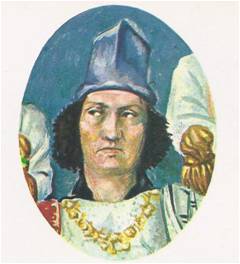WHEN MORE than a century of war between England and France ended in 1453, it was the French king, Charles VII, who was victorious. Although he had driven the English out of France, Charles found himself the king of a sad land. During the wars the great French nobles had fought among themselves as bitterly as they had fought the English and they had become so powerful that they no longer respected their king. France itself was devastated, the people poor and hungry. Paris had been half ruined. Wolves prowled the city by night and twenty-four thousand houses stood empty. …
Read More »Tag Archives: Philip III
Feudal France 814-1314
AFTER THE BREAKUP OF CHARLEMAGNE’S Empire, France, the western half of the empire, was ruled by a series of weak kings. They were so weak that they were known as the “do-nothing kings,” and indeed, they could do nothing to stop their powerful and greedy nobles from fighting among themselves. Finally the Carolingian line came to an end and the Franks, as the French were then called, elected a new king. He was Hugh Capet, a relative of the famous Count Odo who had directed the defense of Paris against the Vikings. With Hugh began the line of Capetian kings …
Read More »
